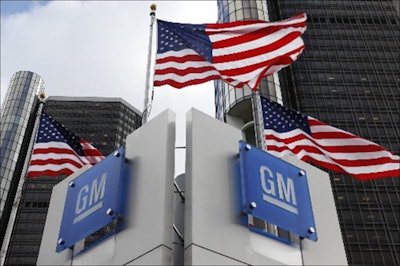
MILFORD TOWNSHIP, Mich. (AP) — General Motors plans to cut $5.5 billion in manufacturing, purchasing and administrative costs during the next three years, helping to finance a big push into autonomous cars and car- and ride-sharing services.
The company told investors Thursday that the savings in logistics, manufacturing, information technology and other costs will more than offset increased investments in brand development and new technology.
GM says it will start testing a fleet of self-driving Chevrolet Volt plug-in hybrid cars late next year at its giant technical center campus north of Detroit. It also announced two car- and ride-sharing services that it expects to generate added profits. The test Volts will be summoned by employees with a smartphone app.
CEO Mary Barra said the tests will allow GM to form a relationship with customers "for a whole variety of ways people can get from point A to point B." She said GM plans to disrupt the auto industry in new forms of mobility..
Product Development chief Mark Reuss said the autonomous car tests aren't being announced just to get media attention. "We're not doing this as a publicity stunt. This is real," he said. He wouldn't predict when the public will be able to use autonomous cars on real roads but hinted that a forecast would come during a presentation for analysts.
The company also made a key prediction about reduced battery costs for electric cars that could speed price reductions. Currently its battery cost per kilowatt hour is $145, but that will drop to $100 by 2018, a reduction that could make the cars more competitive with internal combustion engines.
GM now sells the Chevrolet Volt, which can go about 40 miles on battery power before a gasoline generator kicks in. It also has promised to roll out the Chevrolet Bolt, a $40,000 fully electric car with a 200-mile range, in 2017.
The company also said during its annual investor presentation that global growth initiatives will increase earnings per share to $5 to $5.50 next year. GM projects full-year earnings this year of $4.50 per share this year, up from $4.12 in 2014.
Pretax profit margins, the percentage of revenue that GM gets to keep, will grow to 9 to 10 percent by early next decade, the company said. Currently they're at 6.8 percent.
It expects total sales in China to slow to a 3 to 5 percent annual growth rate between now and 2020. The market had been growing at a 17 percent annual rate from 2008 through 2014.
The company predicts that global auto sales will rise substantially from 85 million this year to 130 million by 2030.
Few details were given early about how GM will reach the $5.5 billion cost reductions, but Reuss said the company expects to cut $2 billion in material costs alone by 2018. A slide in the presentation to analysts shows that a reduced number of parts is part of the cost cuts. A door in a Cadillac ATS, which went on sale in 2012, had 25 parts, but that's been reduced to two in the new CT6, which is new this year.
Barra said it's too early to gauge the impact of Volkswagen's diesel emissions cheating scandal on government pollution regulations worldwide, but she said GM plans no changes. "We have a lot of confidence in our diesel technology," she said.
Volkswagen has admitted installing software on 11 million cars with four-cylinder diesel engines worldwide that turns on pollution controls during government tests and turns them off on real roads. The scandal caused the U.S. Environmental Protection Agency and similar agencies worldwide to tighten test requirements.
GM shares rose 47 cents to $30.49 in morning trading Thursday.






















